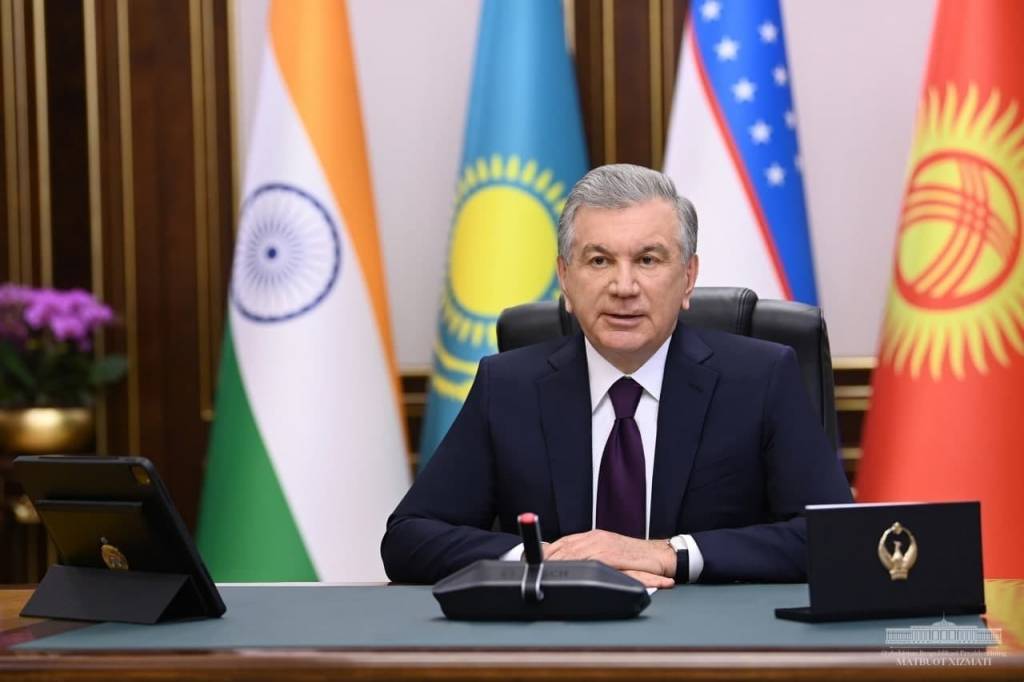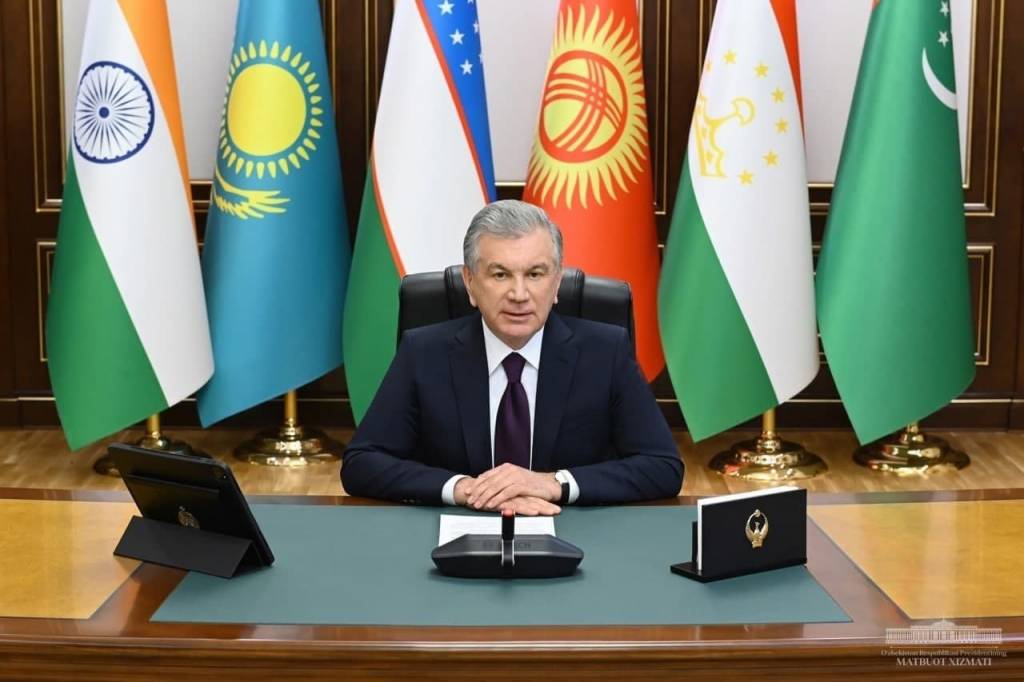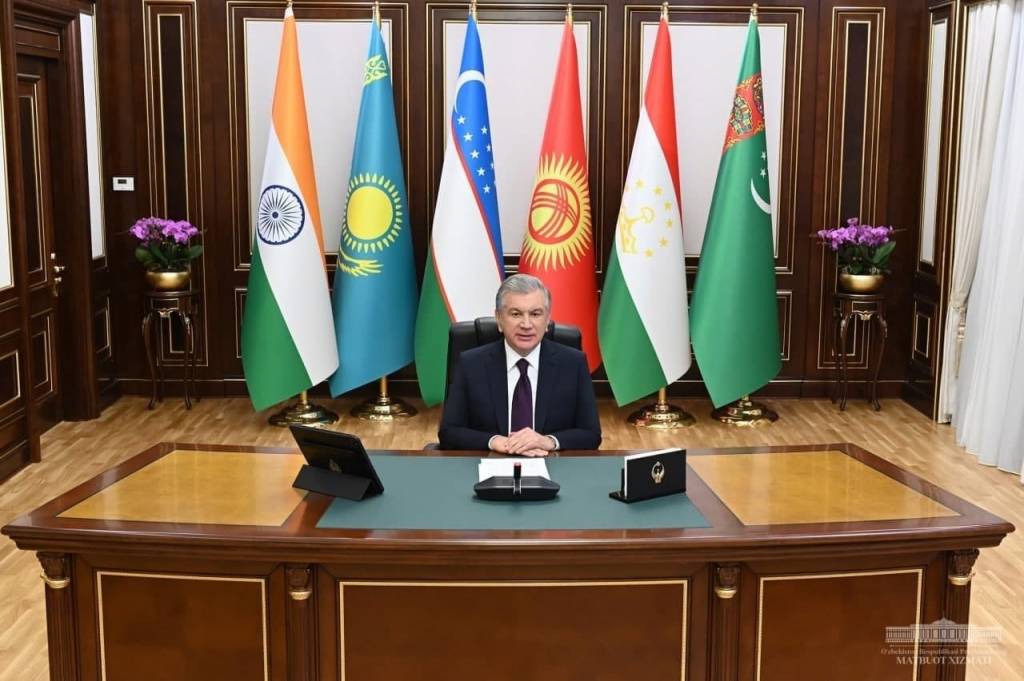
On January 27, President of the Republic of Uzbekistan Shavkat Mirziyoyev took part in First India – Central Asia Summit, via videoconference.
The event, organized at the initiative of the Prime Minister of the Republic of India Narendra Modi, was also attended by the President of the Republic of Kazakhstan Kassym-Jomart Tokayev, the President of the Kyrgyz Republic Sadyr Zhaparov, the President of the Republic of Tajikistan Emomali Rahmon and the President of Turkmenistan Gurbanguly Berdimuhamedov.
The leaders considered the prospects for further strengthening traditionally close and friendly ties, enhancing multifaceted cooperation between the countries of the region and India. Views were exchanged on the current issues of international politics.
The President of Uzbekistan emphasized the importance of this meeting in deepening the strategic partnership and forming a new agenda for regional cooperation in the long term.
A reliable basis for this is the deep historical roots that bind our countries and peoples. Thus, intensive humanitarian exchanges and trade relations between the region and India, a mutual enrichment of culture, traditions and spiritual values have been carried out for thousands of years.

The President of Uzbekistan defined strategic priorities and put forward specific proposals to promote practical cooperation in India – Central Asia format.
The priority is the development of human capital through active interaction in education and healthcare based on the introduction of India’s best practices, knowledge and technologies.
Modern multidisciplinary medical centers in Uzbekistan, created jointly with Indian partners in recent years, are given as an example. At the same time, further expansion of the network of such clinics will be carried out at the branches of the leading Indian medical universities in Uzbekistan.
The President called for the implementation of investment projects for the production of pharmaceuticals, the acceleration of mutual recognition of vaccination certificates, the launch of training programs for virologists, and the widespread introduction of traditional medicine methods. It was proposed to hold a joint Health Forum annually to promote these initiatives.
Branches of three major Indian universities are successfully operating in the sphere of education in Uzbekistan. Programs are being implemented to create international schools, and the Indian method of language teaching is being introduced.

The Leader of Uzbekistan proposed to develop a roadmap focused on opening new universities and professional education centers, establishing a scientific and academic exchange, supporting innovative developments and start-ups.
Broad prospects for partnership in information technology were noted. India makes a great contribution to the development of the domestic IT industry as one of the global leaders in digitalization.
An initiative has been put forward to adopt a regional cooperation program for the development of digital innovations, fintech and blockchain technologies, cybersecurity and training, including based on existing platforms.
President Shavkat Mirziyoyev proposed to define the deepening of economic partnership as the second most important strategic priority.
In recent years, the trade turnover between Uzbekistan and India has almost doubled, the number of joint ventures has increased to 400. Large investment projects are being implemented. Cooperation between Andijan region and the state of Gujarat is successfully developing.
The importance of giving momentum to the activities of the India – Central Asia Business Council was noted to stimulate direct contacts at the level of business and regions, to identify new growth points in investment and trade.

The President of Uzbekistan emphasized the priority nature of the issues of effective transport communication between the countries of the region and the creation of modern infrastructure.
A proposal was supported to launch a mechanism for multilateral meetings of transport ministers to develop a program for the development of dry ports network, provide discounts and preferential tariffs, and simplify customs procedures for cargo transportation.
The main attention is paid to the study of India’s best practices and the prospects for cooperation in energy efficiency and green development. It was proposed to discuss issues of regional cooperation in this area during the International Forum in September this year in the Aral Sea region.
The cultural and humanitarian sphere was named the third priority area. The need for developing a joint program of events, which provides for the cooperation of museums, the organization of exhibitions and conferences, the digitalization of manuscript funds and the creation of a virtual library, the study of the common historical and archaeological heritage, was noted.

On the occasion of the 30th anniversary of the establishment of diplomatic relations with India, it was also proposed to hold festivals of Indian culture and cinema in the countries of the region.
The President of Uzbekistan dwelled on the continuing difficult situation in Afghanistan. The importance of taking measures to promote stability and security, prevent the aggravation of the humanitarian crisis in this country, and promote large infrastructure projects was emphasized.
The Leader of Uzbekistan congratulated Prime Minister Narendra Modi and the friendly people of India on Republic Day and the forthcoming 75th anniversary of the country’s independence.
In their speeches, other heads of delegations also noted the wide opportunities for enhancing partnerships and regional interaction, primarily in trade, investment, innovation, transport, infrastructure, industry, agriculture, culture and tourism.
Following the summit, the Delhi Declaration was adopted, which outlines common approaches to key issues of further strengthening friendship and multifaceted partnership between the states of Central Asia and India.
UzA








